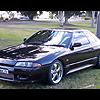Starting Problem
Announcements
-
Similar Content
-
Latest Posts
-
When I was eyeing off the 370GT (after deciding I didn't want to spend 30-40k+ to relive my early 20s in an R33) I thought it'd be a good project to add a turbo to it. Now that I have a 370GT, and I've had a couple of chances to open it up, I'm pretty stunned by how much power it makes 🫠 Honestly, the way the VVEL opens it up, it almost feels like there's a little turbo tucked away in there somewhere. It's like Nissan looked at VTEC and said "hold my beer" 😁 Has anyone thrown a turbo into their 370Z or 370GT? Is there a conservative boost level you can run without having to upgrade the fuel system, or are bigger injectors and a bigger pump a given?
-
Well, this, but braided line to the sender that is mounted on the chassis. Oil Pressure doesn't need to be close, while I prefer Oil Temp is in the active oil flow (bro science, not sure how much it matters). That's how I've had mine set up for years and it works OK
-
Welcome back! There is a v series forum, a little quiet at times but every new active member helps
-
But, per MBS206's question, what happens when it doesn't start. When you turn the key to IGN, do the dash lights come on (then go off after a couple of seconds) - likely alarm or other electrical issue When you turn the key to STRT do you head a clear click (the starter solenoid trying) without the engine turning (likely starter motor)
-






Recommended Posts
Create an account or sign in to comment
You need to be a member in order to leave a comment
Create an account
Sign up for a new account in our community. It's easy!
Register a new accountSign in
Already have an account? Sign in here.
Sign In Now